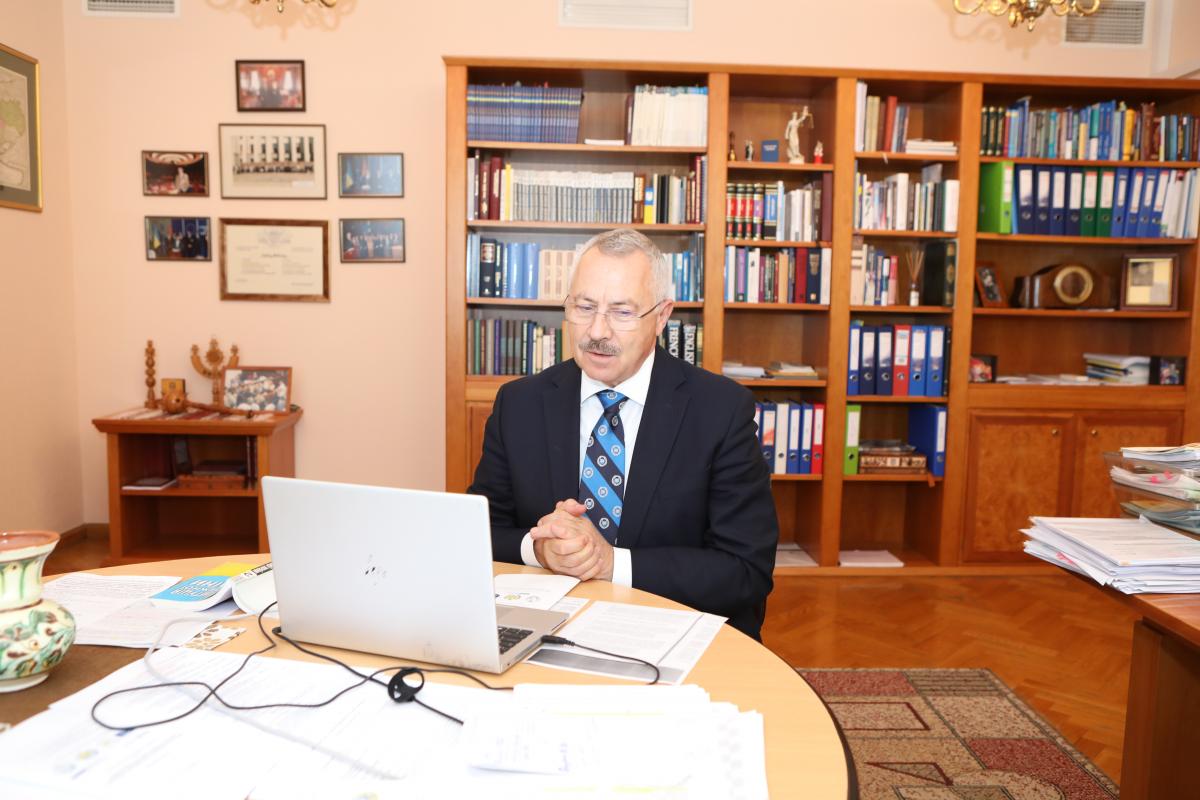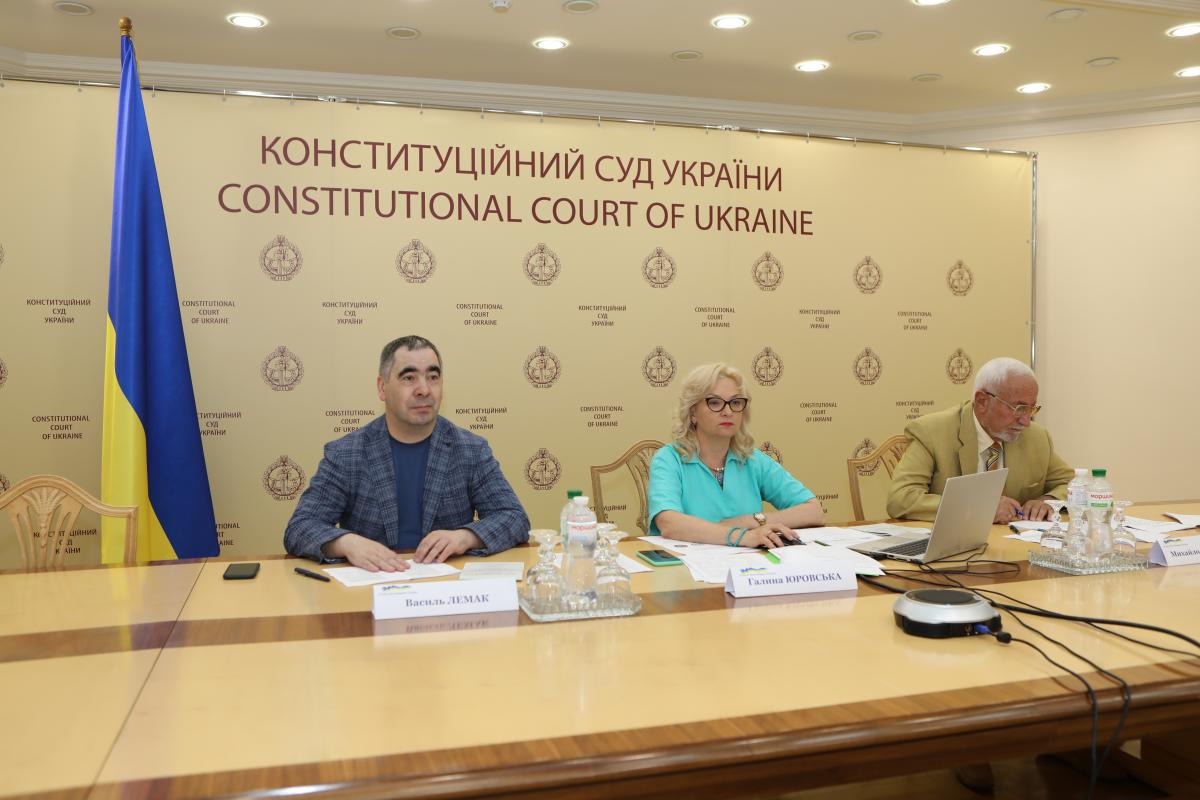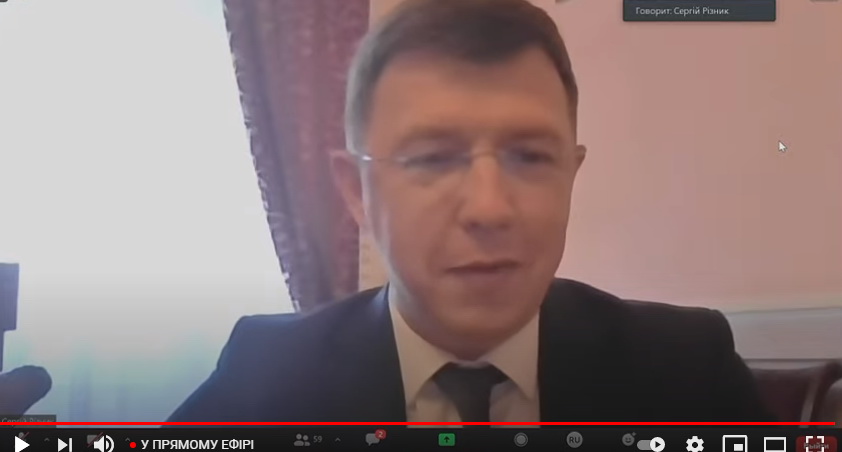The Participants of the Scientific and Practical Conference Discussed the Principle of Separation of Powers and its Guarantee by the Bodies of Constitutional Justice
On June 18, on the occasion of the 25th anniversary of the Constitution of Ukraine, the third scientific and practical online conference "The Principle of Separation of Power and its Guarantee by Constitutional Justice Bodies" was held.
A scientific event brought together judges of the Constitutional Court of Ukraine, former judges of the Constitutional Court of Ukraine, members of the Research Advisory Council of the Constitutional Court of Ukraine, the scientific and academic community, foreign experts and legal practitioners. The conference was organiSed by the Constitutional Court of Ukraine in co-operation with the National Academy of Legal Sciences of Ukraine, Ivan Franko National University of Lviv with the support of the OSCE Project Co-ordinator in Ukraine.
Welcoming the participants of the conference, Deputy Chairman of the Constitutional Court of Ukraine, Doctor of Law, Corresponding Member of the National Academy of Legal Sciences of Ukraine Serhiy Holovaty expressed gratitude to domestic and international experts, noting that they are permanent and reliable partners of the Constitutional Court of Ukraine.
 Serhiy Holovaty addressed the historical aspects of the essence of the phenomenon of "constitutionalism". He emphasised that the first classical act in which the philosophical doctrine of natural law was embodied in the legal dimension was the Declaration of the Rights of Man and of the Citizen of 1789. In particular, he cited Article 16 of the document, which states that a society in which the guarantee of rights is not ensured or the separation of powers is not clearly established does not have a constitution.
Serhiy Holovaty addressed the historical aspects of the essence of the phenomenon of "constitutionalism". He emphasised that the first classical act in which the philosophical doctrine of natural law was embodied in the legal dimension was the Declaration of the Rights of Man and of the Citizen of 1789. In particular, he cited Article 16 of the document, which states that a society in which the guarantee of rights is not ensured or the separation of powers is not clearly established does not have a constitution.
According to Serhiy Holovaty, the Constitution of Ukraine embodies the ideas of natural law, which require the separation of powers in order to guarantee the practical implementation of human rights, which are one of the core components of constitutionalism. At the same time, he pointed out that the Constitution of Ukraine should be tested in practice; therefore today's event will facilitate the analysis of the Ukrainian Basic Law in terms of implementing the principle of separation of powers.
Deputy Dean of the Faculty of Law of Ivan Franko National University of Lviv, Deputy Head of the Research Advisory Council of the Constitutional Court of Ukraine, Candidate of Law, Associate Professor of the Department of Constitutional Law Serhiy Riznyk stressed that the principle of separation of powers is fundamental. He assured that the principles of the rule of law, protection of human rights, implementation of these legal constitutional principles and values in real practice are a priority for the scientific community.
Former Judge of the Constitutional Court of Ukraine, Candidate of Law, Associate Professor, Doctor of Law, Scientific Adviser on Legal Issues of the Oleksandr Razumkov Ukrainian Center for Economic and Political Studies Petro Stetsiuk in his speech discussed, in particular, certain aspects of the body of constitutional jurisdiction and the scientific community, aimed at establishing Ukraine as a sovereign, social, democratic state.
First Vice President of the National Academy of Legal Sciences of Ukraine, Professor of Criminology at the Yaroslav Mudryi National Law University, Member of the Research Advisory Council of the Constitutional Court, Doctor of Law, Professor, Full Member of the National Academy of Sciences of Ukraine Volodymyr Zhuravel noted that the separation of powers is one of the basic principles in building a democratic state governed by the rule of law. According to him, the principle of separation of powers should be clearly regulated by law and guaranteed by the constitutional judiciary in order to prevent encroachments and violations by any branch of power.
Oleksandr Vodyannikov, the National Legal Adviser to the OSCE Project Co-ordinator in Ukraine, noted the purpose of the principle of separation of powers. According to him, there is no global idea of separation of powers, each country approaches its implementation differently, and therefore it is important that Ukraine has its own clear model of the principle of separation of powers.
 Judge of the Constitutional Court of Ukraine, Candidate of Law Halyna Yurovska, who moderated the event, thanked its organisers and emphasised the content and professionalism of the opinions provided by scholars at the request of the Constitutional Court of Ukraine.
Judge of the Constitutional Court of Ukraine, Candidate of Law Halyna Yurovska, who moderated the event, thanked its organisers and emphasised the content and professionalism of the opinions provided by scholars at the request of the Constitutional Court of Ukraine.
During the two sessions of the scientific and practical conference, the participants discussed the constitutional foundations of the functioning of state power in Ukraine.
Professor of the Department of Philosophy and Law and Legal Logic of the National Academy of Internal Affairs, former judge of the Constitutional Court of Ukraine, Member of the Research Advisory Council of the Constitutional Court of Ukraine, Doctor of Law, Professor, Full Member of the National Academy of Legal Sciences of Ukraine, Corresponding Member of the Academy of Pedagogical Sciences of Ukraine Mykhailo Kostytskyi and Senior Researcher, Doctor of Law Natalia Kushakova-Kostytska in their report "Between Law and Legislation: the Theory and Practice of Separation of Powers in Ukraine" discussed the genesis of the development of the idea of separation of powers, the nature of power in the philosophical and legal plane.
Mykhailo Kostytskyi noted that power is domination, management, control, demanding subordination and it is never enough, because the desire for power is a psychophysiological motive. The professor described the situation regarding the distribution of power in Ukraine and outlined a number of problems related to the unwillingness of each branch of power to lose or share these powers.
In turn, Natalia Kushakova-Kostytska stressed that despite the largely declared nature of the principle of separation of powers, it is necessary to adhere to it as much as possible in order to further develop democracy and prevent authoritarianism in public administration.
Professor at the University of Regensburg Rainer Arnold in his report "Separation of Powers and Constitutional Justice" emphasised the principle of "rule of law" as an important element of the value system. According to the professor, constitutional jurisdiction does not violate the principle of separation of powers, on the contrary, it helps as an element of the rule of law.
Senior Researcher of the Department of Problems of Criminal Law, Criminology and Judicial System of the Volodymyr Koretskyi Institute of State and Law of the National Academy of Sciences of Ukraine, Member of the Research Advisory Council of the Constitutional Court of Ukraine, Candidate of Law Mykola Siryi in his report "Good Governance as a Basis for Establishing the Principle of Separation of State Power" stressed on the separation of powers in the Ukrainian and European sense, its nature and components.
The speaker noted that the separation of powers is today's reality of the civilised world. According to him, power should be maximally distributed in society, distributed at the level of economic opportunity, supported by civil activity and various forms of government implementation. Recalling the first decision of the Constitutional Court of Ukraine on the status of deputies and the incompatibility of the deputy mandate with other activities, the speaker pointed out that it also applies to the separation of powers and determines the place of each branch of power in the general state mechanism.
Olena Boryslavska, Doctor of Law, Associate Professor, Professor of the Department of Constitutional Law, Faculty of Law of the Ivan Franko National University of Lviv, noted that the Constitutional Court as a body of constitutional justice is the most important institutional tool, as well as the instrument for implementing the principle of separation of powers.
In her speech, Olena Boryslavska spoke in detail about the problems of separation of state power, its reflection in the practice of the Constitutional Court of Ukraine, and analyzed some aspects of guaranteeing this principle in the process of constitutional review of amendments to the Constitution of Ukraine.
Judge of the Constitutional Court of Ukraine, Doctor of Law, Professor, Corresponding Member of the National Academy of Legal Sciences of Ukraine Vasyl Lemak expressed his views on the constitutional principle of separation of powers, in particular, noting that this principle is mandatory for the judiciary. In every constitutional decision, the speaker stressed, it is necessary to look for a balance where judicial restraint ends and judicial activism begins.
The clear legal position of the Constitutional Court of Ukraine is defined in its decision on the unconstitutionality of the law on the all-Ukrainian referendum, which states that the people having a sovereign prerogative to exercise constituent power, and given that the constitution itself is a product of this constituent power, means that the constitution is also binding on the people as a subject of power. The people can amend the Constitution of Ukraine, the Judge said, but in a manner determined by the Constitution itself.
Vasyl Lemak also stressed the importance of correctly defining the subject and object of constitutional control during the preventive review of draft laws amending the Constitution of Ukraine. He noted that in this context it is important to analyse the understanding of human rights, which, in his opinion, are institutional tools for their protection.
The Judge noted that the mechanism related to the examination of draft laws for compliance with Articles 157 and 158 of the Constitution of Ukraine determines the protection of the core of the Constitution of Ukraine - a certain set of values, among them the main are human rights, which are subject to unconditional protection.
Head of the Department of Constitutional Law of the University of Cardinal Stefan Wyszyński, Former Judge of the Constitutional Tribunal of the Republic of Poland, Special Adviser to the Constitutional Court of Ukraine, Professor Mirosław Granat spoke about the stages of introduction of the principle of separation of powers in the Constitution of the Republic of Poland, the peculiarities of its application and the practice of the Constitutional Tribunal of the Republic of Poland in considering this category of cases. The system of government in Poland, he said, is based on the distribution and balance between the legislature, the executive and the judiciary. Analyzing the case law, Mirosław Granat emphasised the need to recognise real disputes and those created by the government artificially.
Former Judge of the Constitutional Court of Ukraine, Candidate of Law, Associate Professor, Doctor of Law, Scientific Adviser on Legal Issues of the Oleksandr Razumkov Ukrainian Center for Economic and Political Studies Petro Stetsiuk drew the participants' attention to the principles of implementing the principle of separation of powers. In his speech, he covered the issue of the role of the Constitutional Court of Ukraine in the context of compliance with the principle of separation of powers, noting that the constitutional review body is the guarantor of compliance and guarantee of the fundamental constitutional principle.
Head of the Department of Procedural Law, Faculty of Law of Yuriy Fedkovych National University of Chernivtsi, Member of the Research Advisory Council of the Constitutional Court of Ukraine, Doctor of Law, Professor Oksana Shcherbaniuk emphasised constitutional values in the reasoning of decisions of constitutional courts. She believes that the safeguard and legal protection of the principle of separation of powers depends on the Constitutional Court, because it is the Court that is the bearer of a single legal ideology and fills this principle with real meaning.
Professor of the Department of Theory and Philosophy of Law of the Ivan Franko National University of Lviv, Doctor of Law, Professor Oksana Hryshchuk, having analysed the practice of the Constitutional Court of Ukraine, spoke about the practice of constitutional courts concerning the protection of constitutional values. In addition, she covered the issue of the hierarchy of constitutional values.
Liubomyr Letnianchyn, Candidate of Law, Associate Professor of the Department of Constitutional Law of the Yaroslav Mudryi National Law University, also provided his speech at the event.
Based on the results of the discussion, the conference participants came to the conclusion that every citizen should be clearly aware of the importance of the provisions of the Constitution of Ukraine as a foundation for building an independent, just and democratic state that ensures a dignified life.
A video recording of the conference is available on the Court's official YouTube channel.





